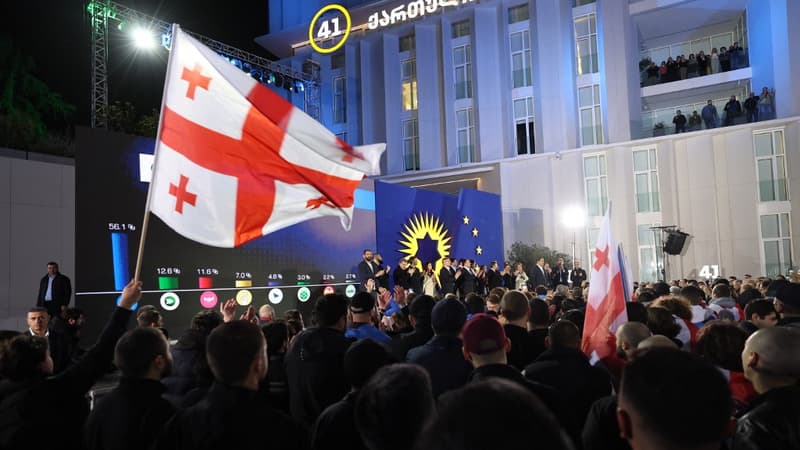The victory announced this Sunday, October 27, of the ruling party in the legislative elections in Georgia distances this Caucasian country from joining the European Union and risks bringing it closer to Moscow, according to the pro-Western opposition that denounces “stolen elections.”
The Georgian Dream obtained 54.08% of the votes, compared to 37.58% for the pro-European coalition, according to the count carried out in more than 99% of the constituencies, said the president of the central electoral commission in a press conference. . Giorgi Kalandarishvili.
The victory announced this Sunday, October 27, of the ruling party in the legislative elections in Georgia distances this Caucasian country from joining the European Union and risks bringing it closer to Moscow, according to the pro-Western opposition that denounces “stolen elections.”
The opposition refuses to recognize its defeat
During the night, the opposition, which had initially claimed victory based on exit polls, however refused to admit defeat.
“We do not recognize the distorted results of the stolen elections,” Tina Bokoutchava, head of the United National Movement (UNM), one of the four parties in the opposition coalition, declared at a press conference.
Denouncing “a constitutional coup”, Nika Gvaramia, leader of the Akhali party, claimed that the opposition had “deciphered the pattern of falsification” of the vote.
“As demonstrated by the results published by the central electoral commission, the Georgian Dream has achieved a solid majority” in the new parliament, declared the party’s executive secretary, Mamuka Mdinaradze, on Saturday night.
The government should have 91 seats out of 150 in Parliament. A sufficient majority to govern, but below the three-quarters that he wanted to obtain to modify the Constitution and, according to his project, prohibit pro-Western opposition parties.
“A period of instability”
The country is entering “a period of indefinite instability and its European hopes have faded, at least while the Georgian Dream is in power,” says analyst Gela Vasadze of the Georgia Center for Strategic Analysis.
“The period is revolutionary in nature, but the opposition lacks charismatic leaders who can channel popular anger to provoke a wave of protests that is likely to bring political change,” he continues.
Convinced that the Georgian dream “stole the elections,” Mariam, 32, a human resources manager who does not give her name, does not know what attitude opposition supporters will take: “Go ahead and demonstrate, or do what what Belarusians do”. “I left the country and started a new life somewhere else.”
There are already demonstrations against a Russian-inspired law
Georgia was rocked in May by large protests against a “foreign influence” law, modeled on Russian legislation on “foreign agents” used to crush civil society. Brussels subsequently froze the European Union accession process and the United States imposed sanctions against Georgian officials.
The opposition accuses the Georgian Dream, in operation since 2012, of pro-Russian authoritarian drift and of distancing Georgia from the EU and NATO, which it also aspires to join.
Brussels, which did not react on Sunday, warned that Georgia’s chances of entering the EU would depend on these elections organized in this former Soviet republic in the Caucasus of about four million inhabitants.
Another cause of tensions with Westerners: a law that severely restricts the rights of LGBT+ people in this country with an Orthodox Christian tradition where hostility towards sexual minorities remains strong.
Some Georgian Dream leaders are very critical of Westerners. Their leader, Bidzina Ivanishvili, called them a “global war party,” which would treat Georgia, their victim, as “cannon fodder.”
Viktor Orban hailed the victory of the Georgian Dream
This country on the Black Sea is still very marked by a brief war in 2008 with the Russian army.
In conclusion, Russia set up military bases in two Georgian breakaway regions, Abkhazia and South Ossetia, whose unilaterally proclaimed independence it recognized.
In this context, the Georgian Dream campaigned presenting itself as the only one capable of preventing a supposed “Ukrainization” of Georgia.
This is the argument that guides Temuri Titovi, a 52-year-old businessman, who explains in Russian that he wants stability and good relations with his powerful neighbor: “That’s right, there is such a big neighbor.” or not, we have to have relations with it, tourists and economic relations,” he says.
The first foreign leader to react on Saturday, Hungarian Prime Minister Viktor Orban, the only EU leader to remain close to Moscow, welcomed the ruling party’s “overwhelming” victory.
Source: BFM TV


